![]()
Thu, Jan 20, 2011 | The Meir Amit Intelligence and Terrorism Information Center
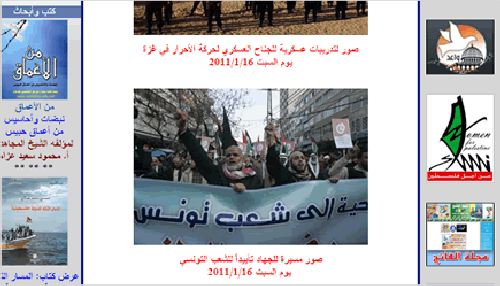
The Palestinian Islamic Jihad, which followed Hamas in praising the Tunisian uprising, held a march in support of the Tunisian people in Gaza City on January 15 (Hamas' Palestine-info website, January 16, 2011).
Hamas Exploiting Tunisian ‘Intifada’ as Islamist Challenge to Arab Nationalism
Hamas spokesmen (mostly unofficial) praise the popular Tunisian intifada (uprising) and expect a domino effect to lead to the downfall of Mahmoud Abbas and other pro-Western “dictatorial regimes.” However, Hamas has not mentioned Egypt and Jordan by name in order not to worsen its already troubled relations with them.
Overview
The media and spokesman of Hamas (although in most instances not official spokesmen), the Palestinian Islamic Jihad and other Palestinian terrorist organizations repeatedly praised the overthrow of the “corrupt, dictatorial, oppressive” regime in Tunisia through what they called “a popular intifada [uprising].” They called for other Arab countries to copy the Tunisian intifada and overthrow pro-Western “dictatorial” Arab regimes.
Their statements reflect the hopes held by Hamas and the other Palestinian terrorist organizations that a domino effect will topple other pro-Western Arab regimes, particularly Egypt and Jordan. At the same time, in order not to worsen their already troubled relations with those countries, Hamas and the Palestinian Islamic Jihad have not mentioned them by name (making do with heavy-handed hints obvious to any Arab reader).[1] On the other hand, the Hamas media do not hesitate to specifically call for the violent overthrow of the Fatah regime in Judea and Samaria, creating a parallel between Mahmoud Abbas and ousted Tunisian ruler Zine El Abidine Ben Ali.
Hamas activists describe the events in Tunisia as a “popular revolution” against a dictatorship, stressing the right of the Tunisian people to choose its leaders democratically. Nevertheless, despite Hamas’ totalitarian Islamist character, and despite the fact that Islamists were not involved in the events in Tunisia, Islamists are trying to make the most of the situation.
The Main Reactions of the Palestinian Terrorist Organizations
Hamas
Hamas’ media and spokesmen, most of them not official, were quick to praise the overthrow of the Tunisian regime. The main reactions were the following:
A. The Hamas forum posted an open letter praising the overthrow of what it called Tunisia’s “corrupt, dictatorial, oppressive” regime through a “blessed popular intifada” (January 16, 2011).
In a posting on Hamas’ website, Dr. Ibrahim Hamami wrote that the dictatorship in Tunisia was overthrown by an intifada [uprising]. He wrote that Mahmoud Abbas had been in contact with the Tunisian dictator, and ended by saying “we are next in line and so are other [Arab peoples]” (Hamas’ Palestine-info website, January 15, 2011).
The Hamas website also posted an article by Abd al-Bari Atwan, the editor of the London-based daily Al-Quds Al-Arabi. He thanked the Tunisian people for humiliating the pro-Western regimes, and ended by saying that “…the coming days might be very difficult for many dictatorial Arab regimes, if not for all of them…I would like to end by suggesting to Hillary Clinton that she prepare an island somewhere in the Indian Ocean for many of her friends and allies from the Arab dictatorships” (Hamas’ Palestine-info website, January 15, 2011).[2]
Fathi Qara’wi, a member of the Hamas faction in the Palestinian Legislative Council in Judea and Samaria, wrote that the Tunisian ruler had declared war on [the Islamic] religion when he put limitations of the use of head coverings [for women] and forbade polygamy. His ouster, wrote Qara’wi, was a “great achievement,” which sent an important message to those who doubted people’s ability to change their fate. The United States and other Western countries which supported “oppression and dictatorship,” and the dictatorial counties in the Arab world had to correct the mistakes they had made regarding the Palestinian people by “lifting the siege” and “implementing democracy,” the means by which Hamas was elected. According to the article, “the era of the people has begun,” and the entire Arab world is on the threshold of a new era. Therefore, it said, the time has come for the regimes and leaders who “harmed their people, drank their blood and forced their rule on those people” to make quick to flee, “because the people have awoken and are planning for what comes after Tunisia” (Hamas’ Palestine-info website, January 16, 2011).
Sami Abu Zuhri, Hamas spokesman, said that it was the right of the Tunisian people to choose their leaders democratically (Website of the interior ministry of the de facto Hamas administration and Hamas’ Palestine-info website, January 15, 2011).
A columnist who signed himself “Izz al-Din” called for the residents of the West Bank to learn from the Tunisian people, who had overthrown a tyrannical rule which had lasted for 23 years. He called for the overthrow of the “Fatah tyranny,” claiming that the West Bank needed a leadership which would rein in the [peace] initiative and take the decision to enter into a confrontation without fear of detentions or bloodshed. Thus “only through confrontation and bloodshed was the Tunisian regime overthrown” (Hamas’ Palestine-info website, January 15, 2011).
The Hamas organ Felesteen printed articles analyzing the significance of the revolution in Tunisia. Dr. Yusef Rizka, Ismail Haniya’s political advisor and deputy chairman of Felesteen’s board of directors, wrote that “the popular revolution” in Tunisia could succeed in other Arab countries. He said that the Arab people no longer agreed to the idea of presidents who stayed in office for life and regimes based on oppression and prisons (Felesteen, January 16, 2011). Mustafa Sawaf, Felesteen’s former editor in chief and advisor to the minister of culture in the de facto Hamas administration, called on the Arab peoples living under “dictatorial, fascist, oppressive” regimes to follow in the footsteps of the Tunisian people and rise up against their rulers (Felesteen, January 15, 2011).
The Palestinian Islamic Jihad
On January 15 the PIJ organized a demonstration in Gaza City in support of the Tunisian people. The PIJ congratulated the Tunisians for having “taken their freedom by force.” It expressed hope that “the blood of free people” from Tunisia would help “Palestine” and the other people in the world in the struggle against Israel and the United States (Paltoday website, January 15, 2011).
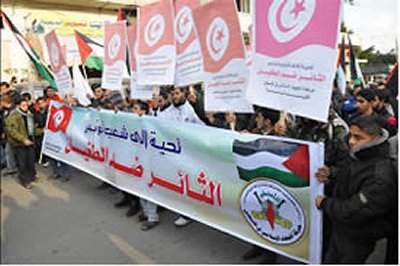
The demonstration in support of the Tunisian people organized by the PIJ in Gaza City (Paltoday website, January 15, 2011).
The Democratic Front for the Liberation of Palestine
The Democratic Front for the Liberation of Palestine issued a press release in which it expressed support for the revolution in Tunisia and called on the Arab public to rise up against its “treacherous rulers,” who were following instructions from the United States and other Western countries, and which had “become pastures for marketing the plans of the United States, Egypt and additional [Arab] countries.” The organization stated that the revolution was an incentive for democratic, leftist and secular Arab forces, and that the Tunisian people now had to block the path of “political Islam” and keep it from ruling the country so that “the case of the Gaza Strip” would not be repeated (Al-Mustaqbal al-Arabi website, January 15, 2011).
Hamas spokesman Salah al-Bardawil strongly denounced the statement whose objective, he claimed, was to fight against “Islam and its symbols” in Arab countries (Hamas’ Palestine-info website, January 15, 2011).
In a report on the Hamas website the DFLP denied having issued the statement and claimed that it was a fabrication (Palestine-info website, January 16, 2011). In our assessment, it is possible that Hamas pressured the DFLP to recant.
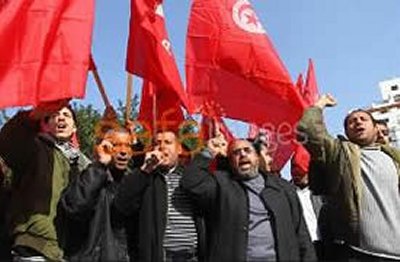
The demonstration in support of the Tunisian revolution organized by terrorist organizations affiliated with the extreme left in the Gaza Strip (Safa News Agency, January 18, 2011).
Notes:
[1] The Democratic Front for the Liberation of Palestine, which is not influenced by considerations of its relations with Egypt, took the step of calling on the Arabs to rise up against their “treacherous rulers,” who turned the Arab states into “pastures for marketing the plans of the United States, Egypt and additional [Arab] countries” (Al-Mustaqbal Al-Arabi, quoting a press release from the DFLP, January 15, 2011). The DFLP later denied having issued the announcement, possibly the result of pressure from Hamas.
[2] The posting appeared on the site’s homepage for an unusual three days (until January 18), indicating that Hamas was interested in having it reach a large number of people.



 RSS
RSS

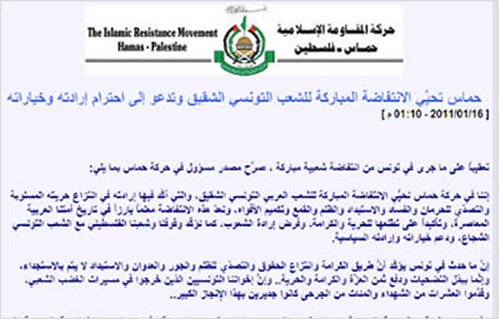
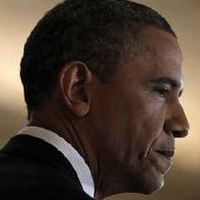
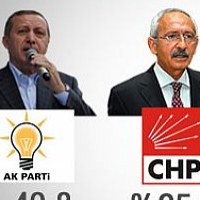







#Hamas Exploiting #Tunisian #Intifada as #Islamist Challenge to #Arab #Nationalism | #Jasmine http://j.mp/f3cKAu
RT @CrethiPlethi: #Hamas Exploiting #Tunisian #Intifada as #Islamist Challenge to #Arab #Nationalism | #Jasmine http://j.mp/f3cKAu